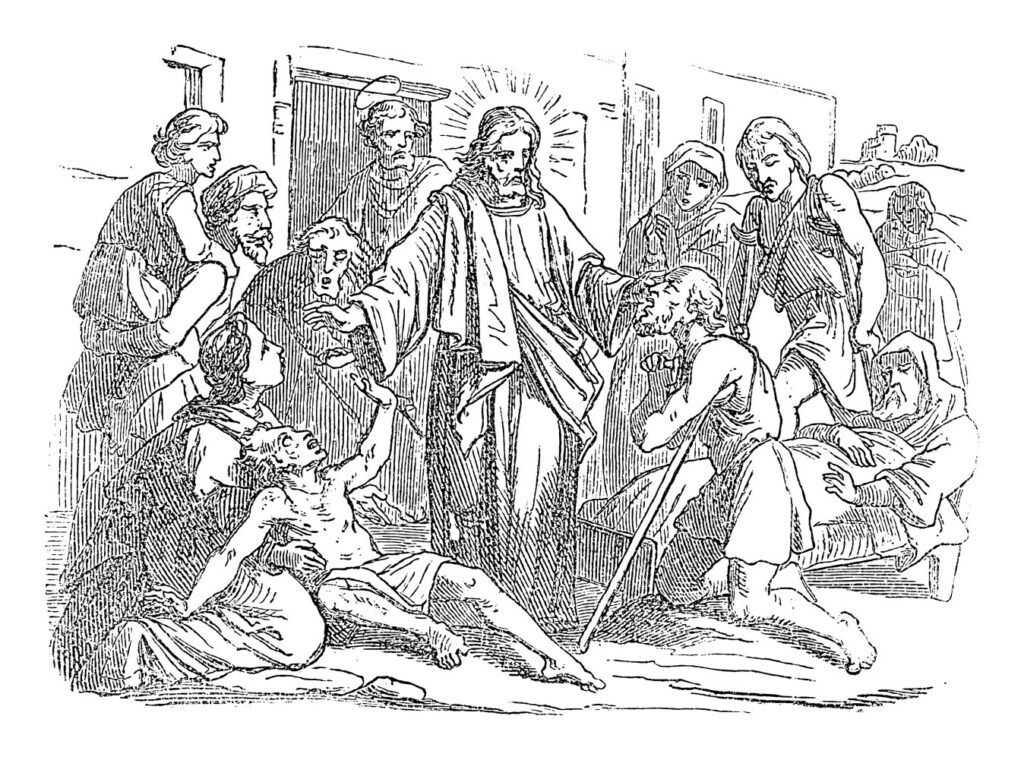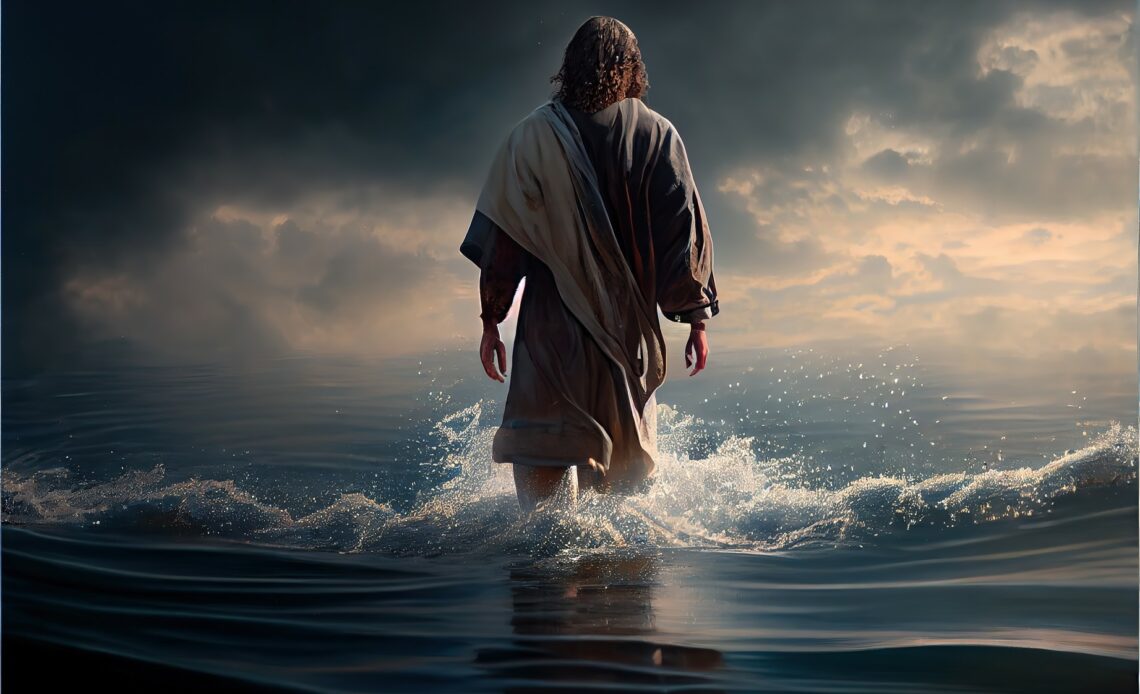“And they came over unto the other side of the sea, into the country of the Gadarenes. And when he was come out of the ship, immediately there met him out of the tombs a man with an unclean spirit, Who had his dwelling among the tombs; and no man could bind him, no, not with chains: Because that he had been often bound with fetters and chains, and the chains had been plucked asunder by him, and the fetters broken in pieces: neither could any man tame him” (KJV, Mark 5:1-4).
“And they came over unto the other side of the sea”
The sea that is spoken of is the Sea of Galilee. Galilee was not a city in Israel. Instead, it was more of a province, much like a state in America. When Jesus was said to be Jesus of Galilee, it spoke of a region rather than a specific city. Nazareth was located in Galilee, as were Capernaum and Cana. Galilee was also the most prominent geographical location where Jesus ministered.
At the beginning of chapter four, we read about how Jesus was teaching beside the sea. Thus, chapter four begins with Jesus’ teaching by the Sea of Galilee. By the Sea of Galilee, Jesus shared a few parables that consisted of seeds and used an illustration of a lamp under a basket.
Then Jesus and His disciples got into a boat and crossed the Sea of Galilee. While crossing the sea, a storm arose, and the disciples were scared. Jesus rose from His sleep and calmed the storm. Thus, Jesus exercised His authority over the elements.
In Mark 4:35, Jesus told His disciples to cross over to the other side of the sea. Finally, in Mark 5:1, we encounter Jesus and His disciples reaching their intended destination.
“into the country of the Gadarenes”
Unfortunately, the manuscript evidence is divided concerning the name of the location that Jesus visited. Gadarenes, Gergesenes, and Gerasenes have been recorded as the location in Mark 5:1.
However, Gerasenes was likely the actual location of Jesus’ arrival in Mark 5:1, which would have referred to a small town named Gersa. It is also the exact location named in Matthew’s Gospel when the Bible speaks of Jesus arriving in the country of the Gadarenes.
In modern times the location is referred to as Khersa or Kursi. A fifth-century church was located through an archeological discovery in Khersa. It is thought by some to be the location of the events in Mark 5. In addition, tombs and a steep descending shoreline are located in Khersa, which have helped to determine the location of the events of Mark 5.
“And when he was come out of the ship”
Jesus reached his destination and wanted to be in Gerasenes. It was not by mistake. He was sent on a mission and was led by the Spirit of God. He was in tune with the Father’s will and could hear the Father’s voice. Thus, Jesus got out of the ship and obeyed the Father’s will.
“immediately”
Mark moves quickly in his Gospel. The word immediately is found time and time again. His fast-paced writing style carries the reader along. He does not add extra words; instead, he is direct and to the point. For example, when Jesus came out of the water at His baptism, He immediately saw the heavens open. Afterward, the Spirit immediately drove Jesus into the wilderness.
When Jesus called Simon and Andrew, they immediately left their nets and followed Jesus. Then Jesus saw James and John and immediately called them. Next, Jesus entered Capernaum and immediately entered the synagogue on the Sabbath. When Jesus taught in the synagogue, immediately a man with an unclean spirit entered. Finally, after He cast out the spirit, Jesus immediately left.

“there met him out of the tombs”
But here we see the event of importance beginning to transpire. Immediately after Jesus got out of the boat, a man came out from the tombs to meet Him. The imagery is telling. Whoever this man was, it is said that he was dwelling among the dead. His dwelling characterized his life. He was an outcast. He did not live nor belong among the people. The deadness that was all around him was an indicator of the deadness that was inside.
“a man with an unclean spirit”
The man who went to see Jesus was not only dead inside, but an unclean spirit possessed him. Thus, he was demon-possessed. In contrast to the Holy Spirit, the Bible speaks of unclean spirits in the world.
The Old Testament has much to say about the clean and unclean. God desired to show the Israelites the importance of the clean and the unclean, the holy and the defiled. Simply put, the spirit was polluted, defiled, and morally corrupt. It was this unclean spirit who had been controlling the man.
“Who had his dwelling among the tombs”
Yet again, we read of a reference to the tombs. Not only did the man come from the direction of the tombs, but it was also where he had been living. Undoubtedly the unclean spirit had influenced the man greatly. The word dwelling carries the meaning of abiding, remaining, continuing, etc. The imagery is that of a man who had been abiding in death.
“and no man could bind him, no, not with chains”
The people of the village sought to bind the man, and they could not. The power of mere man could not subdue the forces of evil that were prevalent in the man’s life. The people of the village noticed the strange activity, and they did everything in their power to overcome it, but they could not.
“Because that he had been often bound with fetters and chains, and the chains had been plucked asunder by him”
No matter how hard the people tried, the man would break the chains and go free to wreak destruction. No matter how tight the chains were applied, there was no hope of subduing the evil that was present. Chains cannot subdue the enemy. The imagery, yet again, is telling.
“and the fetters broken in pieces: neither could any man tame him”
The chains were broken, and the man could not be tamed. So what hope was there for such a man? Indeed all hope was lost. The people had tried everything they could to subdue him but to no avail.
Conclusion
The story of the possessed man is telling. He was dead within and without. All hope seemed to be lost. The people did what they could to subdue and contain the man. Nevertheless, all their efforts proved to be futile.
But as the story goes, there was One Who could do the seemingly impossible.
Jesus said, “But if I with the finger of God cast out devils, no doubt the kingdom of God is come upon you. When a strong man armed keepeth his palace, his goods are in peace: But when a stronger than he shall come upon him, and overcome him, he taketh from him all his armour wherein he trusted, and divideth his spoils” (Luke 11:20-22).
With man, it is impossible to overcome the devil and the power of death. Human effort cannot achieve what only God can do.
Jesus is the Strong Man Who can subdue the enemy and cast out the devil from his dwelling place. However, as the story goes, when someone has been set free by Christ, he must have Christ abiding within, as the unclean spirits will return to their former dwelling. Therefore, the only hope to ward off the enemy and stop his assaults is to have Jesus dwelling within.
While it seemed as if there was no hope for the demoniac in Christ, hope was found. He dwelled among the dead and was dead within. But when Christ came, the man was given life. Unclean spirits overpowered the demoniac, but when Christ came, the unclean spirits did not have the strength to overcome God Almighty. Jesus has shown the world that He has authority over unclean spirits.
In Christ, there is always hope.
Final prayer
Father, I thank You that in Christ, there is always hope. No matter how bad things may seem, Christ can do the impossible. Teach me to trust in Jesus. In Jesus’ name, Amen.


